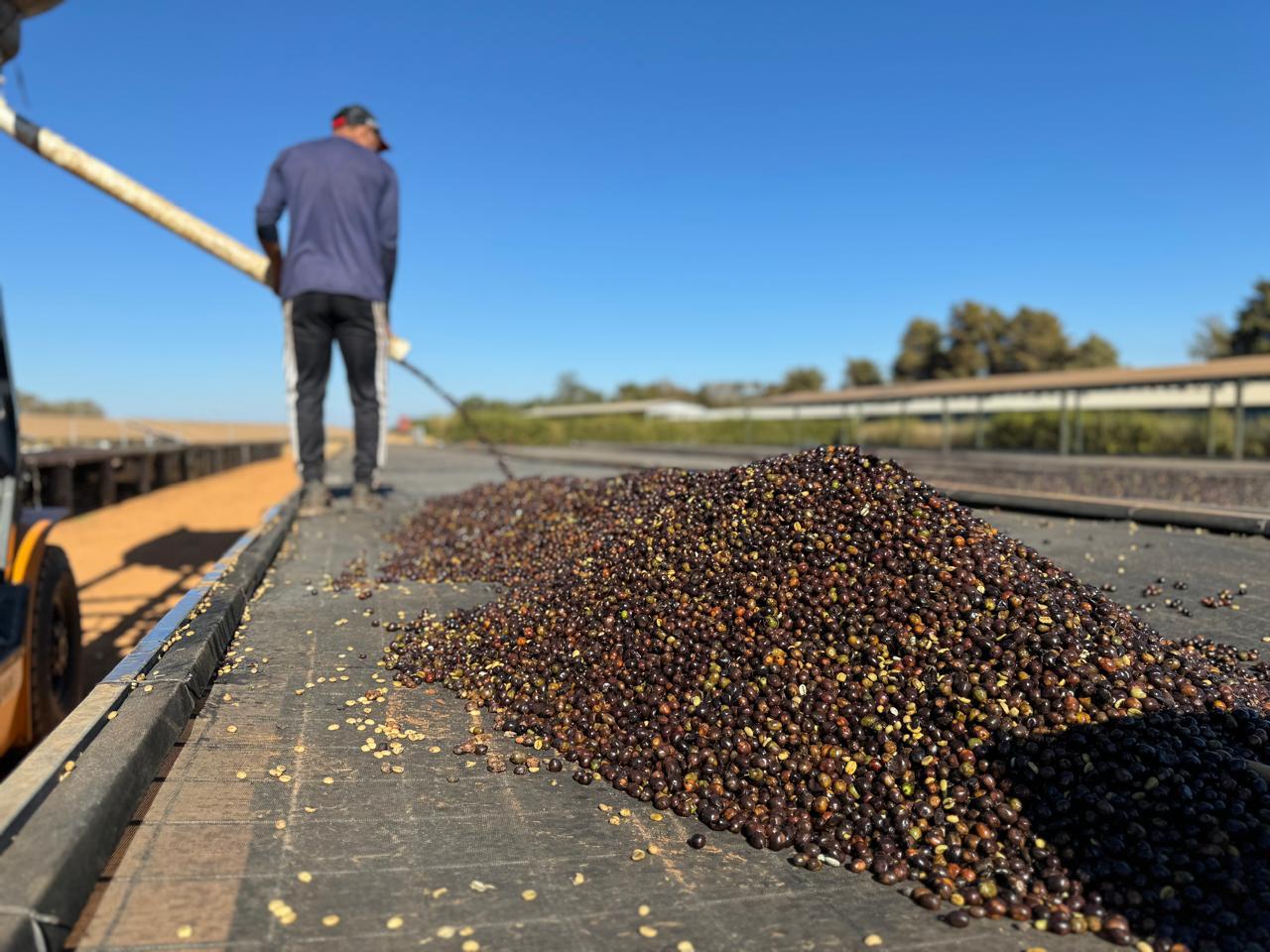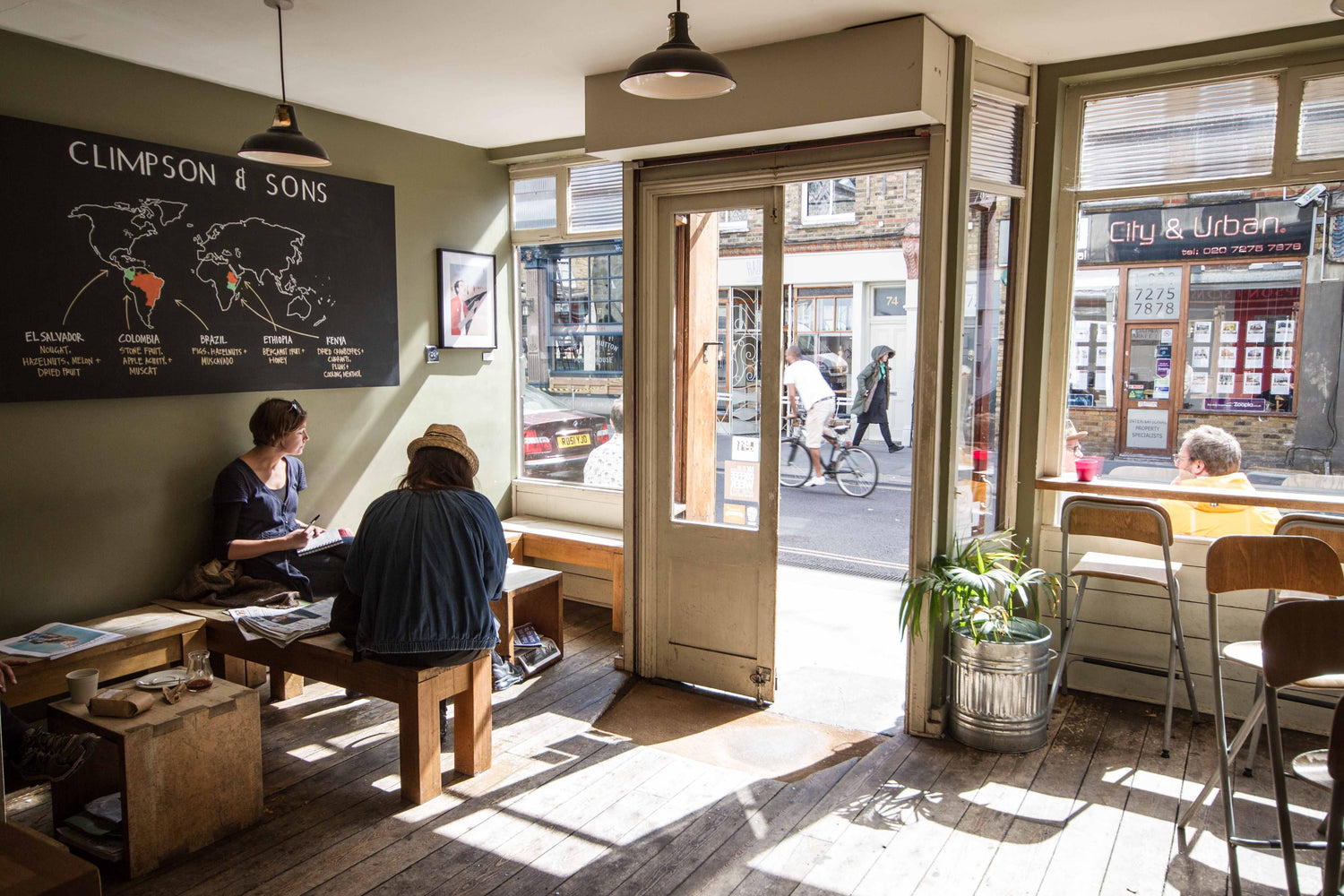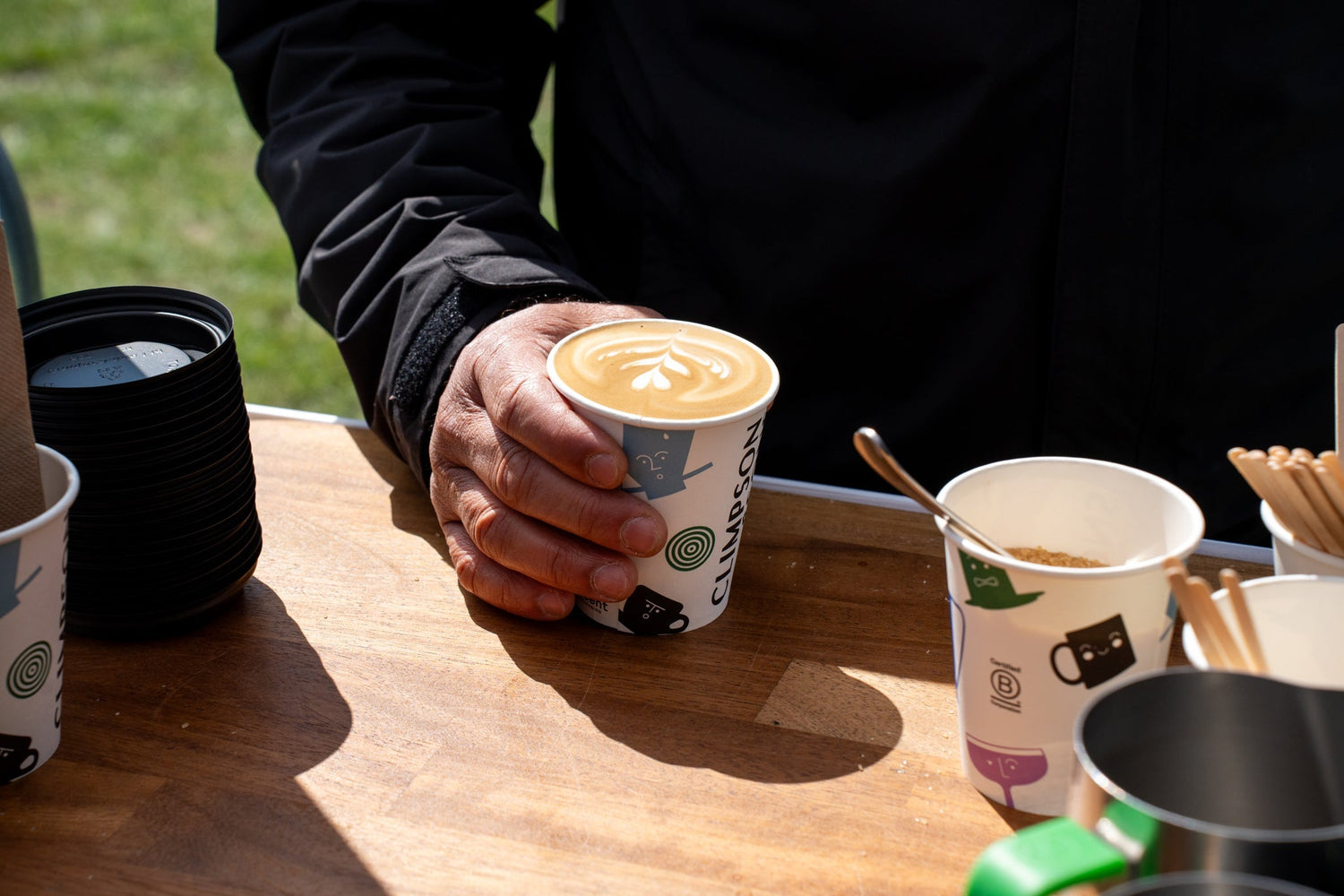A common phrase known around the coffee world is the process of farm to cup, a big factor involved in this is the supply chain process. It’s easy to forget the lengthy process that allows us to sip a tasty coffee on our morning commute, but there’s more to it than meets the eye. For example, the coffee needs to be grown, harvested, dried, packed, bulked, and finally roasted. That’s not to mention the international transportation, export sellers and then on to retailers like grocery stores, cafes and specialty shops.
At Climpsons, we have worked with Daterra for over 10 years for a number of reasons. Our partnership is really important to us, as this coffee is of consistent and delicious quality year after year (we all know this coffee as the foundation coffee for the Baron). We also have a shared interest in ensuring a sustainable supply chain, and their commitment to sustainability is demonstrated through their commitment to the environment, their community and ensuring this farm will be around in the future. We acknowledge that there are many challenges facing the coffee industry as a whole and we want to be in a position to do what we can, where we can and continue to work more sustainably across the board.
International trader Gabriel Moreira's description of Daterra’s vision is: “being internationally recognised for producing very high quality arabica beans, with social and environmental responsibilities.”
Daterra’s farm was conceived in the 80s in Minas Gerais, Brazil, after 10 years of hard graft recovering different areas well enough to produce good quality coffee and ensure a sustainable future. The goal was to stimulate the entire production chain by introducing new methods such as waste practices for discarded produce, soil sample information, monitoring fertiliser usage and fossil fuel usage in equipment. Daterra, meaning ‘from the earth’, really lives up to its mission towards ensuring a sustainable approach.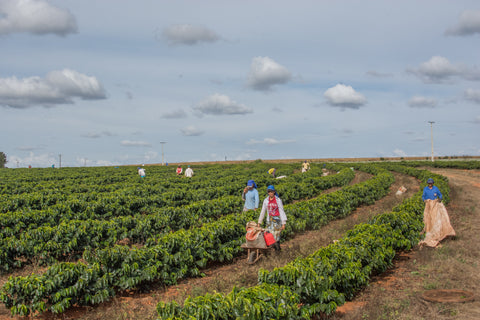
Farmers working in the coffee fields
What does it mean when we discuss sustainability at the source? As a starting point, this can cover three bases: environmental sustainability, social sustainability and economic sustainability.
Environmental sustainability
There are many ways in which environmental sustainability can be achieved, and at Daterra, several practices have been put into place over the years. They hold some of the best sustainability credentials in the industry, becoming the first coffee farm in the world to receive Level A Certification from the Rainforest Alliance.
Here are some of the focuses that Daterra Farm have put into place:
-
The Tree_llion Project is Daterra's initiative to contribute to the global goal by planting three million native trees in Brazil until 2030. Not only focusing on global initiatives, Dattera also donate seedlings to other partner farms and NGO’s.
-
Producing seedlings of native trees in their nursery. In 2021, Daterra built a cold room to store even more seeds. Seeds are always planted in pairs to increase the chances of germination. If both seeds germinate, they will remove one. As they grow, the seeds are acclimated to the sun, and when a seedling with 4 pairs of leaves is mature enough, it will be planted into the field. They will start producing after two and a half years.
-
Fertiliser usage, Daterra divides the farm into small sectors of a maximum of 10 hectares to facilitate the management of the areas. Annually, Daterra carries out a detailed mapping of soil fertility conditions, nutritional status of the coffee tree leaves and expected yield for the next harvest. This process makes it possible to calculate the correct dose of fertilisers to be used so that neither excess or lack of nutrients for the plants occurs.
-
Climate positive farm - Daterra’s carbon assessment also confirms that Daterra is today a climate positive farm – that means through their farm operations, Daterra sequesters more carbon from the atmosphere than is released in their operations.
-
Packaging accounts for around 3% of the coffee supply chain’s total carbon footprint. In a single year, Daterra uses around 22 tons of packaging in a year. As a global supplier, this makes it increasingly difficult to collect and recycle it. Daterra’s partner EuReciclo allows them to compensate for the packaging they are unable to recycle, by funding the recycling for those 22 tons, helping towards a circular economy. These funds go directly to recycling co-ops, thus improving the livelihood of recycling agents and valuing their work for society.
-
Waste practices for discarded produce - During processing, the greatest demand for water is on the wet mill equipment. The equipment used by Daterra is from the eco line, which has a lower demand for water. In addition, this water is reused during each work shift and is regularly monitored to verify that the organic load allows the reuse. Then, the water is sent to a treatment station where it undergoes a decantation and aeration process.
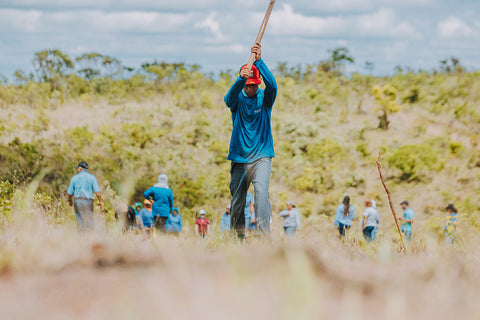
A farmer ploughs the fields before planting trees, Image by Daterra
Making subtle changes is the slow progress to battling a major world issue. Daterra's Nursery program allows for much more control over their growing and planting of seedlings, but comes at a heavy price, as a specialty coffee roaster. We aim to source the best coffee with the least damaging environmental impact, so understanding the supply chain and also seeing it for ourselves is of great importance to this process and partnership.
Economic and Social Sustainability
Understanding the economic and social impacts of sustainability is also an important aspect of the supply chain.
Daterra has around 300 to 600 employees, varying according to the period of the year, being higher at harvest time. The employees are involved in the entire production process, from field workers, tractor drivers, processing and quality control and the administrative sector. The company is a large contributor of jobs in the region.
Social sustainability is important for a number of reasons; the connection between employees, clients, partnerships and companies allows for a connected environment. When sustainability is accessible for all members of the production chain, this creates a better understanding of the climate mission for all workers to achieve the same goals. Daterra’s approach is to sign partnerships with public administration, sign partnerships with companies and overall bring engagement to the community.
Daterra also leads a charitable foundation with their Educar Foundation scheme, this initiative offers children and teenagers educational opportunities, involving literacy and schooling programs that can lead to scholarships, education initiatives, teacher and student workshops and provisions for schools.
Social foundations are extremely important for many reasons; education within is a strong initiative for creating jobs and opportunities. Gabriel Moreira was a student of the Educar student foundation’s community project, then a volunteer at the Daterra farm and progressed to a position in the company’s Trade and International Marketing Department. 
A sign on entry showing Daterra's sustainability certificates
Climate effects on coffee farms - recent climate effects at Daterra?
One of the major factors that works almost like a domino effect is the weather; the most recent example of this is Brazil's cold snap.
Brazil faced an unusual cold snap starting in 2021 that forced many coffee-growing regions to lower coffee production and increase coffee prices. Many factors can cause this, and environmental change is often the cause.
There are over 25 million coffee farmers and workers worldwide. Farmers have generations of knowledge, and those at Daterra farm are very much accustomed to changes in climate, making them adaptable and resilient to the uncertainties of agriculture; however, the impacts of climate change are intensifying at a rate never seen before.
So, how does climate change affect coffee production?
The vast majority of coffee farms are located on the bean belt, a narrow belt around the equator that offers the perfect conditions for these fickle plants to grow. Though this land is under threat with research from Climate Care reveals that by 2050, around 50 per cent of currently viable coffee-growing land will no longer be suited to growing the beans. Much like every crop rotation, farmers rely on cycles of rainfall to produce the flowers that will turn into berries. Therefore, if there is more or less rain, then the number of flowers that develop will be reduced. In this case, a cold snap, which is very unusual, especially in regions like Brazil, farmers have to quickly adjust and adapt to new, damaging environmental weather.
And what about the situation in Daterra?
A statement from Daterra explains the effects that this particular incident caused on the farm:
“Fortunately, we have not been significantly impacted. Our farm in Franca (state of São Paulo) was impacted by the frost at different intensity levels. But this is our smallest farm, and until the present moment, this will not impact our overall production for the next crops.
Our farms in Cerrado (Minas Gerais) are in high areas and haven’t been impacted.
Still, our production will be very small this year. Due to the droughts, we will be producing only 65,000 bags (against 112,000 in 2020), which is quite a huge drop in production and an increase in cost per bag.”
Sustainability has become ubiquitous across many industries, and the coffee industry has been strongly affected. Reduced biodiversity and farmers living in poverty are just some of the issues involved. Climate change is a gigantic mission for our planet to combat, and we have to move as quickly as possible.
The research and processes that Daterra have included within their production are both necessary and a step towards tackling the current climate crisis.
80% of coffee is produced by smallholder farmers, and they’re the ones most vulnerable to this crisis. Sustainability at the source has a very strong impact on the coffee industry as a whole. We can learn much about the coffee production process from the source. Firstly, information from farms is more than encouraging and informative towards Climpsons initiative to apply sustainable methods where they can. Although Daterra are working hard to look to a much more sustainable future, it’s increasingly important that the work being done is widely spread across all coffee communities, not only to inform but to create a strong community. We cannot solely rely on Daterra and other producers to do all the work and as a customer, we encourage curiosity about the coffee supply chain. Who knows, maybe you’ll read Daterra’s mission and pass it on. That way more and more farms, cafes and roasters can work towards a better future.
By Calum Hill

